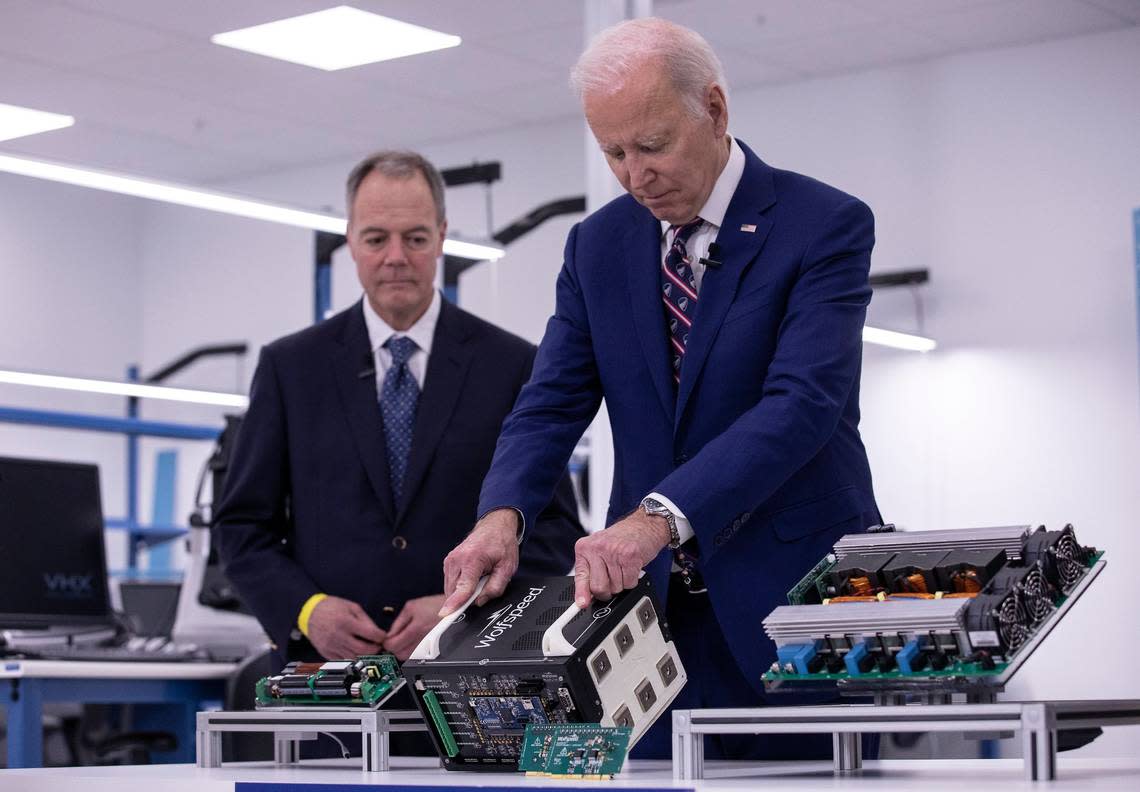Wolfspeed CEO won’t be deposed about Biden’s Durham visit, despite demand from Purdue
Purdue University, the Indiana land grant institution with more than 50,000 students, has raised the possibility that President Joe Biden interfered in an ongoing patent battle between the school and Wolfspeed, a prominent Durham semiconductor manufacturer the president visited this spring.
Last week, a federal district judge in North Carolina called this allegation of potential collusion “unsupported” and ruled the university could not depose Wolfspeed CEO Gregg Lowe to answer questions about what he and Biden discussed when the president toured the company headquarters.
Biden officially visited Wolfspeed to trumpet his administration’s domestic economic initiatives on March 28.
Two days later, U.S. Patent and Trademark Office Director Kathy Vidal intervened in the Purdue and Wolfspeed patent dispute. This timing, university lawyers said, was suspicious.
Purdue initially sued Wolfspeed in 2021, alleging the company’s semiconductor transistors infringed on university patents. Like many defendants in patent disputes, Wolfspeed sought to invalidate the contested patent by challenging it to the USPTO’s Patent Trial and Appeal Board. The university’s patent, No. 7,498,633, involves silicon carbide substrate, a unique semiconductor material Wolfspeed produces.
The Patent Trial and Appeal Board rejected Wolfspeed’s challenge on the basis that the company’s argument was similar to a previously denied ‘633 challenge made by the Swiss semiconductor company STMicroelectronics N.V.
On March 30, two days after Biden visited Wolfspeed, Vidal ordered the board to vacate its initial rejection and hear Wolfspeed’s challenge. Vidal made this decision sua sponte, meaning neither the school nor the company formally requested she do so.
Later that day, Purdue’s lawyers demanded Lowe address his discussions with Biden.
“We intend to take … Lowe’s deposition on the efforts to politically interfere in the (patent review) process and lobby President Biden and others who accompanied him on that trip,” Purdue representatives said.
Judge disputes Biden lobbying allegation
While any proof of political lobbying by Lowe wouldn’t affect the core arguments of the patent lawsuit, discovery of such interference would “go towards the character attack of Wolfspeed,” James Passé, a patent lawyer in Raleigh, told The News & Observer.
Wolfspeed, which has roughly 2,500 employees in the Triangle area, requested a protective order to prevent the deposition, citing a legal principle known as the Apex Doctrine, which protects top executives from spurious or redundant testimony on matters they might not have thorough knowledge of.
“(Lowe) has never been directly involved in (Wolfspeed’s) development, manufacture, sale or distribution of the accused products,” the company said when invoking the Apex Doctrine.
In a supporting memorandum, Wolfspeed lawyers called Purdue’s suggestion of collusion between Biden and Lowe “absurd and baseless.”
On July 17, Judge L. Patrick Auld of the U.S. District Court for the Middle District of North Carolina approved Wolfspeed’s protective order and struck down Purdue’s deposition notice to Lowe.

“(Purdue’s) expressed interest in deposing Lowe regarding an unsupported corrupt bargain with President Biden with no identified impact on the ligation of this case does not satisfy basic relevance and proportionality standards,” Auld wrote.
Purdue had already deposed other Wolfspeed executives to address matters related to the case, Auld reasoned. He described the evidence that Lowe lobbied Biden as “circumstantial” and said it “does not bear scrutiny.”
“Under (Purdue’s) thesis, President Biden would have arrived in Durham for a series of primarily public events, privately engaged with Lowe about a very technical matter involving an obscure federal office (the USPTO), agreed to influence the Director of the USPTO in exchange for unspecified support, subsequently communicated (or caused someone else to communicate) with the USPTO Director, and compelled her to pen a 10-page order, all within the span of 48 hours,” Auld said.
The court ruled Purdue must cover the legal fees Wolfspeed spent protecting Lowe from being deposed. With the side issue of Lowe’s potential deposition seemingly settled, both parties will proceed with the overall patent dispute.
Wolfspeed spokesperson Melinda Walker said the company “can’t comment on pending litigation.”
Michael Shore, a lawyer representing Purdue University, also said the school doesn’t comment on ongoing litigation, but noted the Patent Trial and Appeal Board did eventually reject Wolfspeed’s challenge to the ‘633 patent on its merits. Shore added the patent has survived multiple invalidation attempts.
A spokesperson for the White House declined to comment on Purdue’s allegation.
Open Source
Do you enjoy Triangle tech news? Subscribe to Open Source, The News & Observer's weekly technology newsletter and look for it in your inbox every Friday morning. Sign up here.
